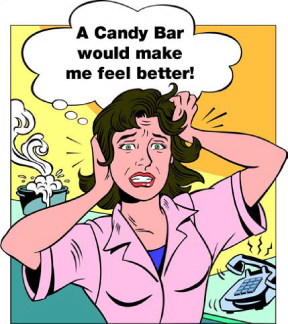How stress makes you fat
Originally written for LawTalk Magazine, published 3 December 2015
 If you’ve been dieting since your teenage years and you’re exercising like mad the calories in/calories out equation that’s been around for so long says the results should be clear. If you’re not seeing the results you expect given the time, effort and sacrifice you’ve put in over the years, if you have ‘stubborn fat’, it could be that it’s far more complicated than simply calories in/calories out.
If you’ve been dieting since your teenage years and you’re exercising like mad the calories in/calories out equation that’s been around for so long says the results should be clear. If you’re not seeing the results you expect given the time, effort and sacrifice you’ve put in over the years, if you have ‘stubborn fat’, it could be that it’s far more complicated than simply calories in/calories out.
Sure, the calories in and out equation is still relevant but there’s growing recognition there could be more to it. Hormones are complicated and when they get out of balance, they start affecting all the systems in our body including weight regulation.
All our focus on fighting the fat by starving ourselves and partaking in endless exercise over the years could have done more harm than good.
If you lead a life full of constant stress it’s likely to be impairing your weight loss efforts. We tend to think of stress as psychological – stress over work, money, family and relationships, but it can also be physiological – lack of sleep, inflammation, chronic infections, exposure to environmental toxins, inadequate nutrition and over- or under- exercise. If you’re already highly stressed about life, work, family and finances, putting strenuous exercise on top (which is simply a physical stressor) only adds to your total stress load and can be counterproductive.
When the stress response is triggered, adrenaline is released and prepares for the ‘fight or flight’ response. Digestion and other ‘non vital’ functions decrease while blood pressure and heart rate increase as your body prepares to fight or flee. We’re designed to cope well with this sort of acute stress – historically we would escape the danger over a short period of time. In nature, 2 to 4 minutes would produce some kind of result from the (hypothetical) tiger chasing us. We’d either fight or flee successfully or not. Presuming we’re successful our stress hormones dissipate as we return back to a normal resting state until the next threat comes along.
Cortisol is released in times of stress and one of its roles is to encourage you to refuel after responding to the stress – all that energy expended fighting the tiger needs to be replenished. As the stress we face these days is typically psychological rather than physical, it requires little energy expenditure to relieve the stress so the urge to eat after the stress is gone is redundant. Chronic elevated cortisol levels also has a number of wider effects throughout the body:
- Raising blood sugar levels and making your cells less sensitive to insulin
- Increasing belly fat and fatty liver
- Reducing the ability to burn fat
- Increasing the rate of fat storage
- Causing hormonal imbalances by disrupting the HPA (hypothalamus, pituitary, adrenal) axis
- Encouraging constant hunger and sugar cravings
- Reducing DHEA (the precursor to repair and sex hormones), testosterone and growth hormone levels
Of course, not all stress is bad, but when you’re under constant stress over a prolonged period of time, your body produces these stress hormones at the expense of your rest and repair hormones. Your stress hormones and repair hormones counterbalance each other, when stress hormones are being produced, your rest and repair hormones are not. Pregnenolone is the precursor to both your stress and your repair hormones. In times of chronic stress, pregnenolone is diverted to produce additional cortisol and adrenaline, leaving little or none for the production of repair hormones (this process is call the Pregnenolone Steal). It’s the rest and repair hormones that you need to be working to help you lose fat.
It’s during the recovery process that your body will repair tissue, get rid of metabolic waste, restore optimal neural function and nutrient, chemical and hormone balance, strengthen immunity and ultimately signal to the body to let go of excess fat.
Intensive exercise while in a chronic state of stress supresses the rest and repair processes and can be counterproductive to fat loss. If you’re one of those people that is constantly under stress from various aspects of your life and you do high volumes of exercise but you’re not seeing the fat loss you think you should, this could be the problem.
However, this doesn’t mean that you need to stop exercising – it just means you need to recognise your physiological stress load and manage your exercise and lifestyle more intelligently to find a balance – reducing volume and adding breathing and working in exercises, restorative yoga, tai chi or chi kung and addressing other lifestyle factors like sleep, hydration, nutrition to manage stress. Shifting the focus away from losing weight and towards being healthy will help to rebalance your body systems and encourage your rest and repair hormones to do their thing.
If you’ve been running on empty for a while now, the process will take time, a shift in mindset and a change in lifestyle but if you’ve been slowly reducing your calorie intake to next to nothing over the years, and the weight is still steadily piling on, what have you got to lose by taking a chance on a new approach?



